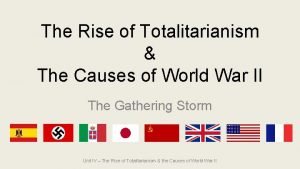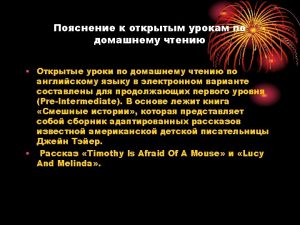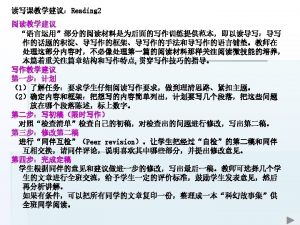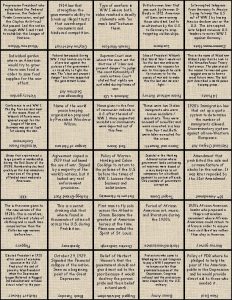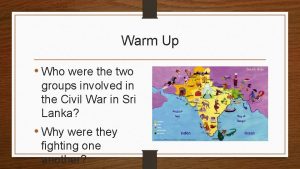Warm Up Agenda 1Who were the two leaders



































- Slides: 35

Warm Up / Agenda 1)Who were the two leaders in the Mali Empire? 2)What was Mansa Musa Famous for?

• Sundiata • Took trade, avenge father • Sundiatabent iron • avenged his father • Timbuktu • Gao • Djenné • MM died • Maghan runs it into ground.

Empire of Songhai Pg 142


Ca Standards 7. 4. 3 Describe the role of the trans-Saharan caravan trade in the changing religious and cultural characteristics of West Africa and the influence of Islamic beliefs, ethics, and law.

The Main Idea • 1. The Songhai built a new empire in West Africa. • 2. Askia the Great ruled Songhai as an Islamic empire. • 3. Songhai fell to Moroccan invaders, ending the great era of West African empires.

The Big Idea • The Songhai Empire strengthened Islam in West Africa.


• BUILDING BACKGROUND • Timbuktu was the greatest city in Mali. But as the empire of Mali grew weaker and fell, the city did not. As a new empire arose in West Africa, its rulers recognized the greatness of Timbuktu. Just as it had been the major city of Mali’s empire, so it was the greatest city in Mali’s replacement—Songhai.

• Sunni Ali • Askia the Great Songhai ruler, he overthrew Sunni Baru. His reign was the high point of Songhai culture. Emperor of Songhai, he conquered Mali and made Songhai into a powerful state.

Sunni Ali • (SOOH-nee ah-LEE) • (died 1492) • Emperor of Songhai, he conquered Mali and made Songhai into a powerful state.

Askia the Great • (c. 1443– 1538) • Songhai ruler, he overthrew Sunni Baru. His reign was the high point of Songhai culture.

The Songhai Build an Empire • Even as the empire of Mali was reaching its height, a rival power was growing in the area. That rival was the Songhai (SAHNG-hy) kingdom. From their capital at Gao, the Songhai participated in the same trade that had made Ghana and Mali so rich. • By the 1300 s the Songhai had become rich and powerful enough to draw the attention of Mali’s rulers. Mansa Musa sent his army to conquer the Songhai and make their lands part of his empire. As you have already seen, Gao became one of the most important cities in all of Mali.

• The Birth of the Empire • Songhai did not remain part of Mali’s empire for long. As Mali’s government grew weaker, the people of Songhai rose up against it and regained their freedom. • Even before they were conquered by Mali, the leaders of the Songhai had become Muslims. As such, they shared a common religion with many of the Berbers who crossed the Sahara to trade in West Africa. Because of this shared religion, the Berbers were willing to trade with the Songhai, who began to grow richer.

Songhai Empire c. 1500

• Growth and Conquest • As the Songhai grew richer from trans. Saharan trade, they expanded their territory. Gradually, they built an empire. • Songhai’s growth was largely the work of one man, Sunni Ali (SOOH-nee ah-LEE), who became the ruler of Songhai in 1464. Before Ali took over, the Songhai state had been disorganized and poorly run. As ruler, he worked constantly to unify, strengthen, and enlarge it.

• Much of the land that Sunni Ali added to his empire had been part of Mali. For example, he conquered the wealthy trade cities of Timbuktu and Djenné. In 1468 the rulers of Mali asked Sunni Ali to help fight off Tuareg invaders who were about to capture Timbuktu. Ali agreed, but once he had driven off the invaders he decided to keep the city for himself. From there he launched attacks against Djenné, which he finally captured five years later. • As king, Sunni Ali encouraged all people in his empire to work together. To build peace between religions, he participated in both Muslim and local religions. As a result, he brought peace and stability to Songhai.

• What did Sunni Ali achieve as ruler of the Songhai?

• Askia the Great • Sunni Ali died in 1492. He was followed as king by his son, Sunni Baru, who was not a Muslim. However, most of the people of the empire’s towns were. They were afraid that if Sunni Baru didn’t support Islam they would lose power in the empire, and trade with other Muslim lands would suffer. As a result, they rebelled against Sunni Baru. • The leader of the people’s rebellion was a general named Muhammad Ture (moo-HAHmuhd too-RAY). After overthrowing Sunni Baru, he took the title askia, a title of high military rank. Eventually, he became known as Askia the Great.

• Religion and Education • Like Mansa Musa, the famous ruler of Mali, Askia the Great took his Muslim faith very seriously. After he defeated Sunni Baru, Askia made a pilgrimage to Mecca, just as Mansa Musa had 200 years earlier. • Also like Mansa Musa, Askia worked to support education. Under his rule the city of Timbuktu flourished once again. The great city contained universities, schools, libraries, and mosques. Especially famous was the University of Sankore (san. KOH-rah). People arrived there from all over West Africa to study mathematics, science, medicine, grammar, and law. In the early 1500 s, a Muslim traveler and scholar called Leo Africanus wrote this about Timbuktu:

• “There are in Timbuktu numerous judges, teachers and priests, all properly appointed by the king. He greatly honors learning. Many hand-written books imported from Barbary [North Africa] are also sold. There is more profit made from this commerce [trade] than from all other merchandise. ”—Leo Africanus, from History and Description of Africa

• Djenné also became a center of learning, especially for medicine. Doctors there discovered that mosquitoes spread malaria. They even performed surgery on the human eye.

The people of Songhai depended on the Niger River for many things. It was an important transportation route and provided fertile lands and a source of water for farming.

• Trade and Government • Timbuktu and Djenné were centers of learning, but they were also trading centers. Merchants from distant lands came to these cities and to Gao. • Most of Songhai’s traders were Muslim, and as they gained influence in the empire so did Islam. Askia the Great, himself a devout Muslim, encouraged the growth in Islamic influence. Many of the laws he made were similar to those of Muslim nations across the Sahara.

• To help maintain order, Askia set up five provinces within Songhai. He removed local leaders and appointed new governors who were loyal to him. One such governor ran the empire for Askia when he was away on pilgrimage to Mecca. When he returned, Askia brought even more Muslim influence into his government. • Askia also created special departments to oversee certain tasks. These departments worked much like government offices do today. He created a standing professional army, the first in West Africa.

• What do you think was Askia’s greatest accomplishment?

• Songhai Falls to Morocco • After Askia the Great lost power to his son in 1528, other askias ruled Songhai. The empire did not survive for long, though. Areas along the empire’s borders started to nibble away at Songhai’s power.

• The Moroccan Invasion • One of Songhai’s northern neighbors, Morocco, wanted to control the Saharan salt mines. To get those mines, Moroccan troops invaded Songhai. With them they brought a terrible new weapon—the arquebus (AHR-kwih-buhs). The arquebus was an early form of a gun. • The Moroccans wanted control of the salt mines because they needed money. Not long before the fight over the mines, Morocco had defended itself against huge invading armies from Portugal and Spain. The Moroccans had eventually defeated the Europeans, but the defense had nearly ruined Morocco financially. Knowing of Songhai’s wealth, the Moroccan ruler decided to attack Songhai for its rich deposits of salt and gold.

• The Moroccan army set out for the heart of Songhai in 1591. Not all of the troops were Moroccan, though. About half were actually Spanish and Portuguese war prisoners. These prisoners had agreed to fight against Songhai rather than face more time in prison. Well trained and various disciplined, these soldiers carried weapons, including the deadly new guns. The Moroccans even dragged a few small cannons across the desert with them.

Which empire comes first? Second…. third?

• The Destruction of Songhai • The Moroccans’ guns and cannons brought disaster to Songhai. The swords, spears, and bows carried by Songhai’s warriors were no match for firearms. • The Moroccans attacked Timbuktu and Gao, looting and taking over both cities. The Moroccans didn’t push farther into Songhai, but the damage was done. Songhai never recovered from the loss of these cities and the income they produced. • Changes in trade patterns completed Songhai’s fall. Overland trade declined as port cities north and south of the old empire became more important. For example, people who lived south of Songhai began to trade along the Atlantic coast. European traders preferred to sail to Atlantic ports than to deal with Muslim traders. Slowly, the period of great West African empires came to an end.

• SUMMARY AND PREVIEW • The empire of Songhai was known for its wealth, culture, and learning. • In the next section you will read more about the major West African cultures and how we know about them.



 Agenda sistemica y agenda institucional
Agenda sistemica y agenda institucional Who were the big three leaders
Who were the big three leaders Who were the axis leaders
Who were the axis leaders Why were military leaders baffled by trench warfare?
Why were military leaders baffled by trench warfare? Alan alexander milne
Alan alexander milne Example of heat transfer by radiation
Example of heat transfer by radiation Two types of leaders sociology
Two types of leaders sociology Two cold air masses converge on a warm air mass
Two cold air masses converge on a warm air mass Future in the past continuous
Future in the past continuous Hát kết hợp bộ gõ cơ thể
Hát kết hợp bộ gõ cơ thể Slidetodoc
Slidetodoc Bổ thể
Bổ thể Tỉ lệ cơ thể trẻ em
Tỉ lệ cơ thể trẻ em Chó sói
Chó sói Chụp phim tư thế worms-breton
Chụp phim tư thế worms-breton Chúa yêu trần thế
Chúa yêu trần thế Môn thể thao bắt đầu bằng từ chạy
Môn thể thao bắt đầu bằng từ chạy Thế nào là hệ số cao nhất
Thế nào là hệ số cao nhất Các châu lục và đại dương trên thế giới
Các châu lục và đại dương trên thế giới Công thức tính độ biến thiên đông lượng
Công thức tính độ biến thiên đông lượng Trời xanh đây là của chúng ta thể thơ
Trời xanh đây là của chúng ta thể thơ Cách giải mật thư tọa độ
Cách giải mật thư tọa độ 101012 bằng
101012 bằng độ dài liên kết
độ dài liên kết Các châu lục và đại dương trên thế giới
Các châu lục và đại dương trên thế giới Thơ thất ngôn tứ tuyệt đường luật
Thơ thất ngôn tứ tuyệt đường luật Quá trình desamine hóa có thể tạo ra
Quá trình desamine hóa có thể tạo ra Một số thể thơ truyền thống
Một số thể thơ truyền thống Cái miệng bé xinh thế chỉ nói điều hay thôi
Cái miệng bé xinh thế chỉ nói điều hay thôi Vẽ hình chiếu vuông góc của vật thể sau
Vẽ hình chiếu vuông góc của vật thể sau Biện pháp chống mỏi cơ
Biện pháp chống mỏi cơ đặc điểm cơ thể của người tối cổ
đặc điểm cơ thể của người tối cổ V cc
V cc Vẽ hình chiếu đứng bằng cạnh của vật thể
Vẽ hình chiếu đứng bằng cạnh của vật thể Vẽ hình chiếu vuông góc của vật thể sau
Vẽ hình chiếu vuông góc của vật thể sau Thẻ vin
Thẻ vin


